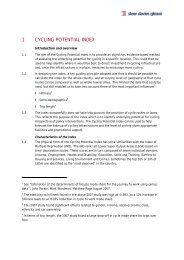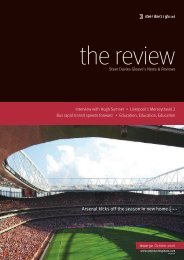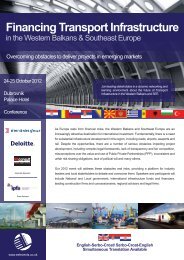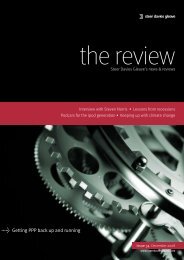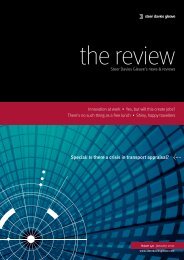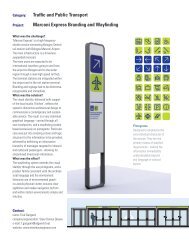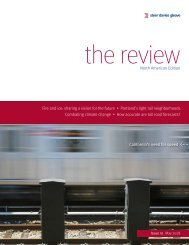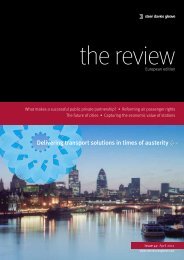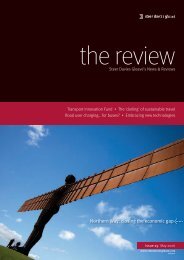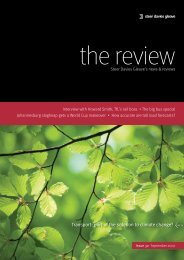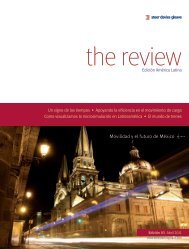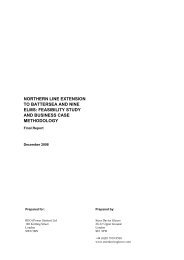Making the cut: UK spending review special - Steer Davies Gleave
Making the cut: UK spending review special - Steer Davies Gleave
Making the cut: UK spending review special - Steer Davies Gleave
You also want an ePaper? Increase the reach of your titles
YUMPU automatically turns print PDFs into web optimized ePapers that Google loves.
Drastic times call for smarter measures<br />
Unprecedented public <strong>spending</strong> <strong>cut</strong>s could just be <strong>the</strong> catalyst smarter choices need to take centre stage.<br />
By Jon Foley<br />
For many transport<br />
professionals, <strong>the</strong><br />
current pinch on <strong>UK</strong><br />
public sector <strong>spending</strong> is<br />
forcing a rethink on <strong>the</strong><br />
future of local transport<br />
planning. This presents<br />
a real opportunity for<br />
smarter choice interventions to come<br />
to <strong>the</strong> fore as <strong>the</strong>y address two key<br />
issues that are on everyone’s mind:<br />
t innovative, low-cost, high-value<br />
options. As <strong>spending</strong> on large transport<br />
infrastructure projects comes under<br />
pressure, <strong>the</strong>re’s an opportunity<br />
to consider lower cost solutions<br />
such as investing in smarter choice<br />
interventions that optimise <strong>the</strong> use of<br />
<strong>the</strong> existing transport network ra<strong>the</strong>r<br />
than changing <strong>the</strong> network itself. Local<br />
authorities have massive assets at<br />
<strong>the</strong>ir disposal – in <strong>the</strong> form of <strong>the</strong>ir<br />
transport networks – and making better<br />
use of <strong>the</strong>se should be a focus during<br />
this period of financial uncertainty.<br />
14<br />
<strong>special</strong> uk <strong>spending</strong> <strong>review</strong><br />
t ways to spend less. We are all thinking<br />
more seriously about our <strong>spending</strong>. In<br />
addition to us as individuals rethinking<br />
how we undertake some journeys<br />
to reduce costs, many organisations<br />
are accelerating a change in working<br />
practices in order to <strong>cut</strong> back <strong>the</strong>ir<br />
<strong>spending</strong> on staff-related travel.<br />
Maximising impacts<br />
The overall cost on travel behaviour<br />
change interventions is typically<br />
much lower than large infrastructure<br />
expenditure. The economics of behaviour<br />
change have also shown that lasting<br />
change to active travel for just tens<br />
of people justifies <strong>the</strong> expenditure of<br />
hundreds of thousands of pounds.<br />
People have been becoming more aware<br />
of <strong>the</strong>ir health and fitness over <strong>the</strong><br />
years, and this trend, combined with<br />
today’s financial pressures, could be <strong>the</strong><br />
catalyst that will accelerate changes to<br />
travel behaviour. Looking at <strong>the</strong> signs:<br />
t One of <strong>the</strong> clear outcomes of <strong>the</strong> soaring<br />
fuel prices in 2008 was that car-use<br />
dropped. The same has happened<br />
recently. As improved road safety figures<br />
were a result of <strong>the</strong> fuel protests, <strong>the</strong><br />
travel behaviour change agenda can<br />
benefit from <strong>the</strong> current economic crisis.<br />
t As people reconsider <strong>the</strong>ir situations,<br />
<strong>the</strong>y are likely to discover what is<br />
literally on <strong>the</strong>ir doorstep. From our<br />
Sustainable Travel Towns experiences,<br />
one Darlington man had said, “I would<br />
cycle but <strong>the</strong>re’s no cycle routes here”.<br />
What he didn’t realise was that <strong>the</strong>re<br />
was actually one less than 50 metres<br />
away from <strong>the</strong> bottom of his garden.<br />
t While <strong>the</strong> proportion of households<br />
with access to a car may not change,<br />
purchases of new cars are falling<br />
and it is possible that <strong>the</strong> car will<br />
be seen as a high-cost option<br />
for a larger number of trips.



